
A new transitional deacon was ordained for the Diocese of St. Cloud Aug. 20 at St. Ann Church in Wadena.
Becoming a transitional deacon is a next step in his formation process toward priestly ordination, which is anticipated sometime next year.
Duncan is a former Methodist pastor, a married father of nine and grandfather of one. Pope Francis made a special exception in July to allow his ordination.
“Becoming a transitional deacon will likely find me being called to greater intimacy with Christ through the rich sacramental nature of the Body of Christ,” Duncan said before his ordination. “Continued fidelity to the Triune God and my dual vocations will change by the graces and responsibilities of Holy Orders. I joyfully look forward to the transitional diaconate as I have sensed — and the Church has confirmed — a sacrificial calling to live the Great Commandment to love God and to serve others as a sacramental minister.”
Duncan and his family completed the Rite of Christian Initiation — a step in the process of converting to Catholicism — in 2007. They were received into the Catholic faith and confirmed in 2016.
St. Cloud Bishop Emeritus Donald Kettler was the main presider at the diaconate ordination with Bishop Patrick Neary, C.S.C., concelebrating.
“I could not be happier for J.C. Duncan and his family as we prepare for his ordination to the diaconate,” Bishop Neary said. “He has a large and compassionate heart, a keen mind, gifts for administration and years of pastoral experience as a former Methodist minister.
“He is supported by the love of his wife, Anne, and they are the parents of nine children, so when it comes to preaching on family life matters, he’ll be an expert. I give thanks to the Holy Spirit for inspiring him to pursue the priesthood and to serve in the Diocese of St. Cloud. I know that Bishop Kettler, who first welcomed him into seminary formation, feels honored to preside at his ordination as a deacon. May he know many years of happiness in his chosen vocation.”
Duncan is grateful to both bishops — especially for Bishop Kettler’s “substantial personal involvement” and for Bishop Neary’s “Hoosier tenacity.”
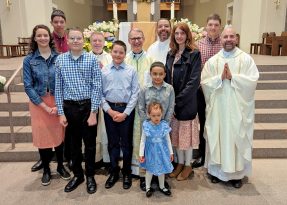
“I am so grateful for the kindness and care shown to my family and me,” Duncan said. “This most certainly includes Father Dave Petron, who graciously accompanied my family and me during our early discernment years. We are also deeply grateful to Father Aaron Kuhn and the people of St. Ann’s in Wadena who journeyed with us, the people of Mary, Mother of the Church ACC who strive to live holy lives, the highly gifted diocesan staff and clergy, and to Saint John’s Abbey and Saint John’s School of Theology and Seminary for their gracious Benedictine hospitality and rich spiritual and personal formation.”
On the ‘pastoral provision’
Some may be asking how a married, former Methodist pastor can be ordained in the Catholic Church. The modern provision of ordaining select converting clergy into the presbyterate of the Latin Rite dates back to 1948. Lutheran clergy from Germany, who were disillusioned with their ecclesial community’s involvement with national socialism, petitioned Pope Pius XII for ordination. Pius personally ordained these men in 1952 after they completed a course of study.
Father Matthew Crane, diocesan vicar for canonical affairs, further explains:
“In 1967, after the close of the Second Vatican Council, Pope St. Paul VI promulgated an encyclical on priestly celibacy, ‘Sacerdotalis caelibatus.’ In paragraph 42 of that encyclical, written to affirm the discipline of priestly celibacy in the Roman Catholic Church, the pope offered an exception to the rule:
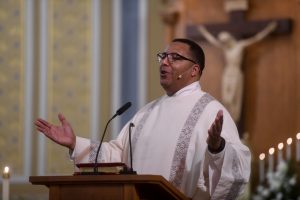
“‘In virtue of the fundamental norm of the government of the Catholic Church, to which we alluded above, while on the one hand, the law requiring a freely chosen and perpetual celibacy of those who are admitted to Holy Orders remains unchanged, on the other hand, a study may be allowed of the particular circumstances of married sacred ministers of Churches or other Christian communities separated from the Catholic communion, and of the possibility of admitting to priestly functions those who desire to adhere to the fullness of this communion and to continue to exercise the sacred ministry. The circumstances must be such, however, as not to prejudice the existing discipline regarding celibacy.’
“In the 1970s, aware of this statement, clergy of the Episcopalian Church in the United States approached Roman Catholic Bishops of the United States, seeking the possibility of entering into the full communion of the Catholic Church and receiving ordination to the priesthood. While the Roman Catholic Church could readily welcome them into the fold, the ordination to priesthood was another matter, as these were married men.
“Ultimately, in 1980, another pope, St. John Paul II, after consulting what was then called the National Conference of Catholic Bishops, established the ‘pastoral provision’ for these men, permitting them to be ordained and granting them a special exception to the discipline of celibacy otherwise required of Roman Catholic priests. This provision is overseen by a local delegate for the United States,” Father Crane said.

The number of married active and retired Latin Rite priests within the United States is estimated at 150-plus men. Some of the 23 Eastern-rite churches in communion with the Holy See, who are governed by the Code of Canons of the Eastern Churches instead of the Code of Canon Law, regularly permit married men to become priests. However, all married clergy in union with the Holy See voluntarily consent to celibacy should their wife die.
“In relaxing Church disciplines and granting Holy Orders to a limited number of married former Protestant clergy,” Duncan explained, “the Church pragmatically balances its innate characteristics of mercy and justice within the framework of the Church’s hierarchy of truths. As in 1948, the Church’s current limited relaxation of the discipline of celibacy demonstrates the Church’s charitable universality and its desire to actively embody Jesus’ prayer ‘that they may all be one’ (John 17:21). At the same time, the Church is not surrendering its dogmatic and immutable teachings.”

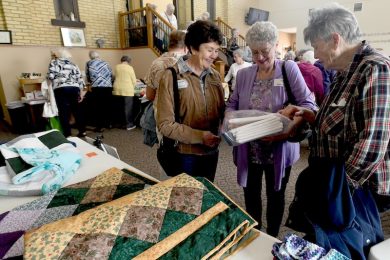


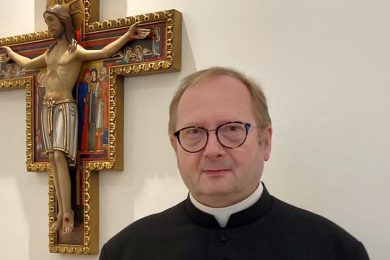
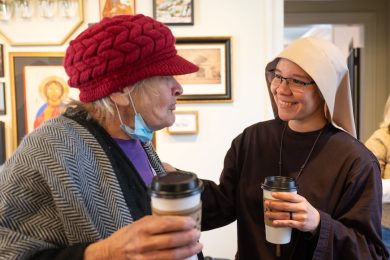
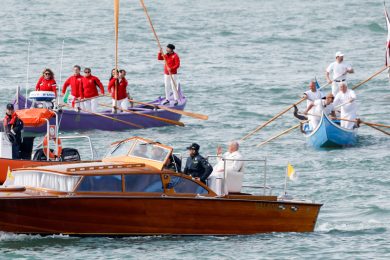

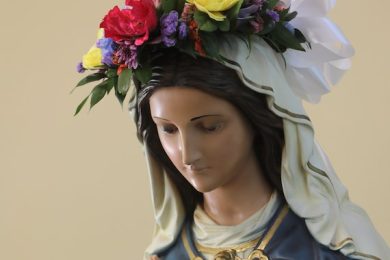


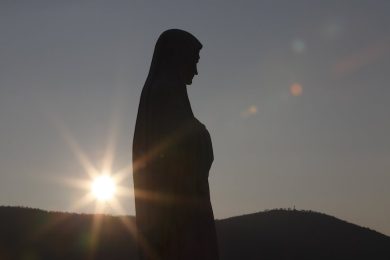

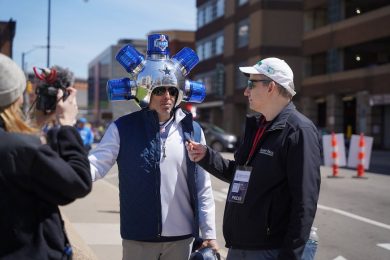
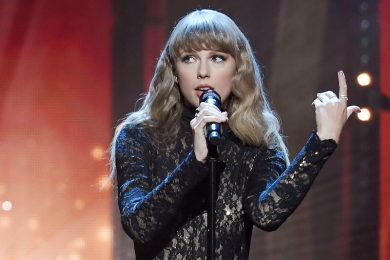





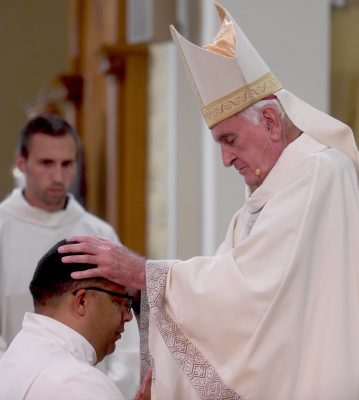
I am glad that our new to-be deacon Jean-Claude Duncan feels so glad to be in communion with us at the altar and in service to the needy among us. It will be a joy to support him and his family and to accept his support. I look forward to meeting him…..May the Holy Spirit keep guiding us as we look for new ways of being church…..Tony Kroll